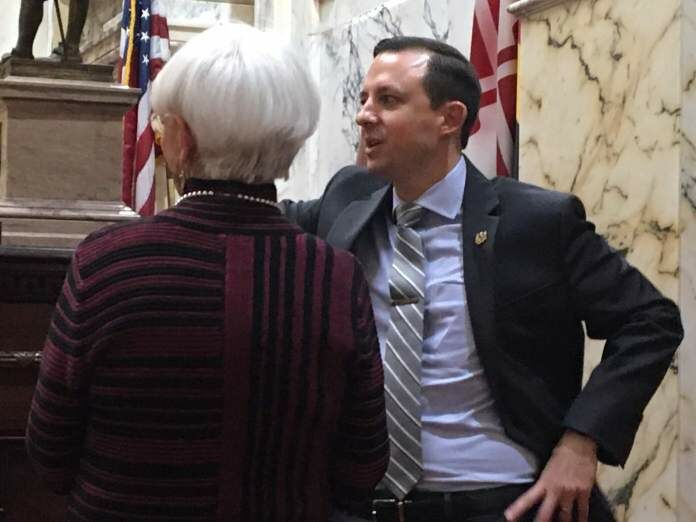This article was republished with permission from WTOP’s news partners at Maryland Matters. Sign up for Maryland Matters’ free email subscription today.

This content was republished with permission from WTOP’s news partners at Maryland Matters. Sign up for Maryland Matters’ free email subscription today.
Members of the Maryland Senate would face a limit on the number of bills they can introduce under a proposal crafted by the chamber’s presiding officer, Sen. Bill Ferguson, and other senior lawmakers.
The move is intended to reduce the workload on legislative bill-drafters, who are deluged with requests from legislators, particularly in December and January. The change would also likely lead to shorter committee hearings.
Under the proposal, each senator would be allowed to request that 30 bills or resolutions be drafted in a legislative session. They could then submit 25 of the 30 for formal consideration by the body.
To encourage lawmakers to get their requests in early — before the legislature convenes — senators would be allowed to pre-file up to five bills that would not count against their cap.
The proposal is the first big change in Senate procedure that Ferguson, a Democrat who represents Baltimore City, has attempted to install since becoming the chamber’s leader a year ago, following the 33-year tenure of Sen. Thomas V. Mike Miller Jr., a Democrat from Calvert County who continues to represent the 27th District as President Emeritus.
“As you are all aware, during the last legislative session, the Senate had several frank and productive conversations concerning the need for bill limits to allow the Senate to be more productive and focused during the legislative session, and provide the ability for legislative counsel and Department of Legislative Services to keep up with their work,” Ferguson said in a letter to his colleagues on Friday morning.
“The proposed rule balances the need for senators to zealously advocate for their constituents, and the need to allow committees to focus on key legislation before them to ultimately create the best work product for the people of Maryland.”
Bills introduced on behalf of a Senate committee, a local delegation or a task force would not count against a legislator’s cap.
In his letter, Ferguson noted that discussions about limiting the number of a bills each senator can introduce preceded the COVID-19 pandemic. He said it is “possible… that the Chamber will discuss lower limits exclusively for the 2021 session, depending on the particulars of this Session.”
A question of priorities
If the 25-bill limit is adopted, lawmakers will be forced to prioritize which proposals they wish to offer for consideration — and could lead them to scotch measures whose prospects of passage are slim. It could also lead to difficult discussions with advocates with whom they are allied, as lawmakers near their bill limit.
Last session several lawmakers submitted more than 40 bills for the Senate to consider. Many committees routinely meet until well into the evening, taking public testimony on dozens of bills at a time.
“A lot of legislators get approached with bill requests, and if you’re a senator, you want to please and placate the person who asked for it,” said Sen. Paul G. Pinsky, a Democrat from Prince George’s County and the chairman of the Senate Education, Health and Environmental Affairs Committee. “But sometimes you know it has no future; it won’t have legs.”
Since becoming chairman of EHE, Pinsky has urged the Senate to limit the number of bills that get introduced and take other steps to allow more time for lawmakers to deliberate on the most important measures.
“As a legislator, I don’t think you can do justice to 20, 30 or 40 bills,” he said. “I don’t think you can do the homework, the time, trying to shepherd them through committees. So it’s long overdue.”
Ferguson’s proposal was produced by a group of Senate leaders that included President Pro Tem Melony G. Griffith, a Democrat from Prince George’s County; Majority Leader Nancy J. King, a Democrat from MontgomeryCounty; Minority Leader J.B. Jennings, a Republican representing Baltimore and Harford counties, and Sen. Michael J. Hough, a Republican from Frederick County.
The proposal is expected to head to the Senate Rules Committee, which would hold a hearing on the measure and then vote on it. Assuming it clears the committee, the bill would head to the full Senate for consideration.
This content was republished with permission from WTOP’s news partners at Maryland Matters. Sign up for Maryland Matters’ free email subscription today.







